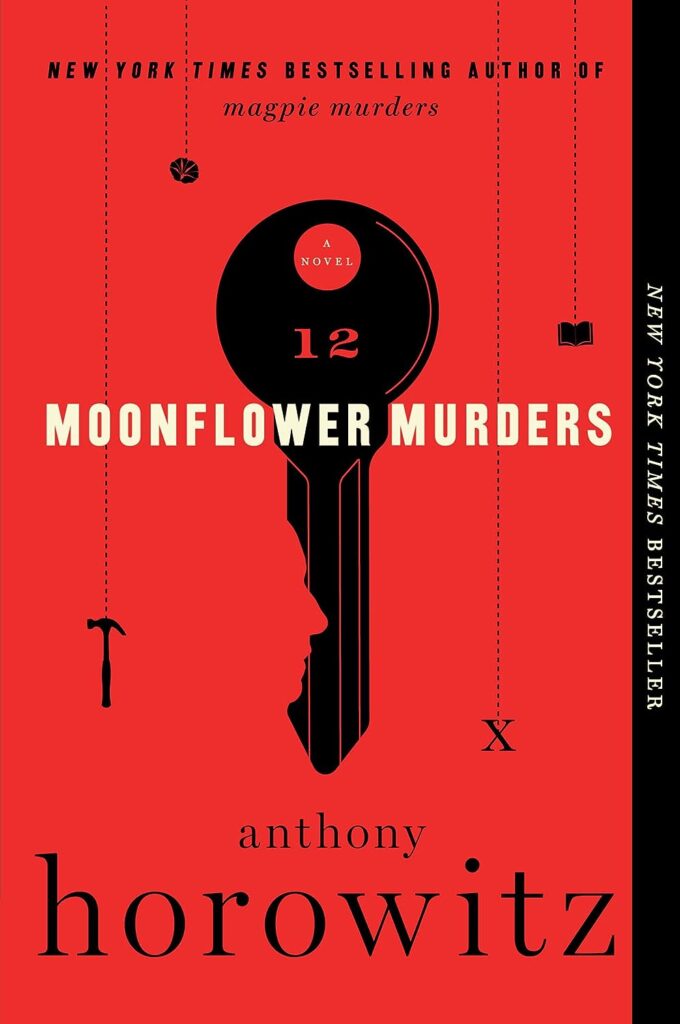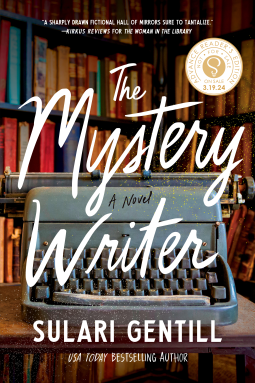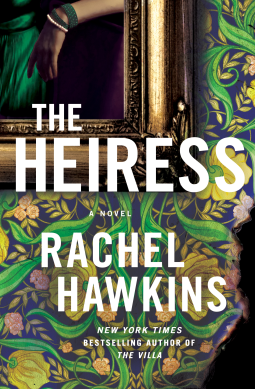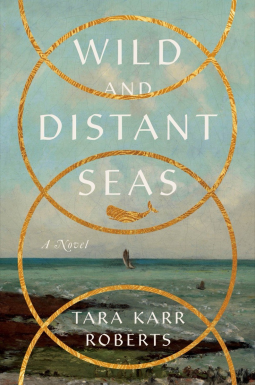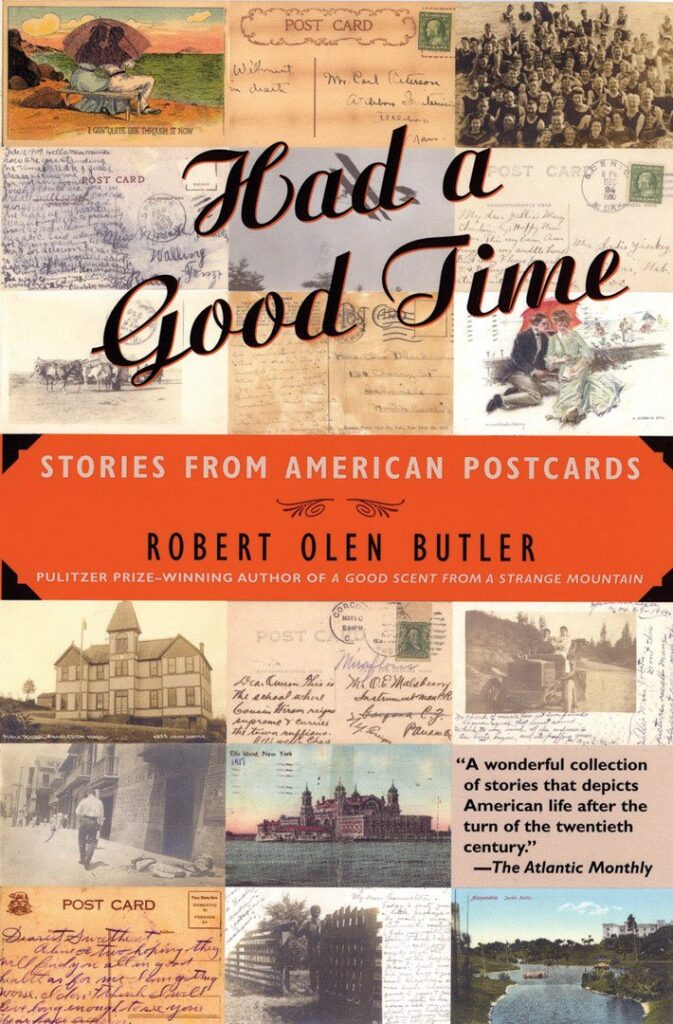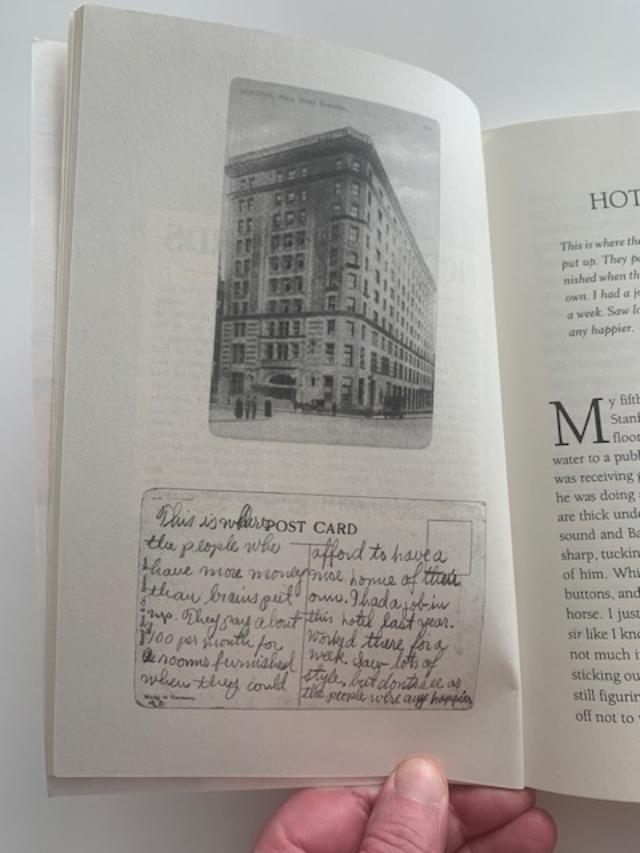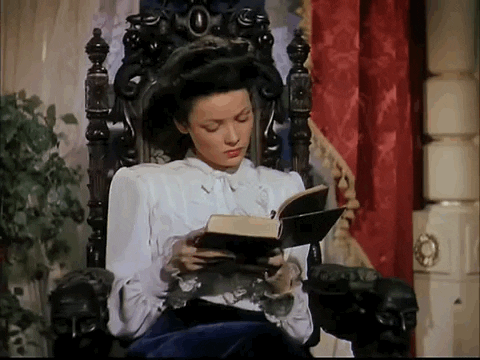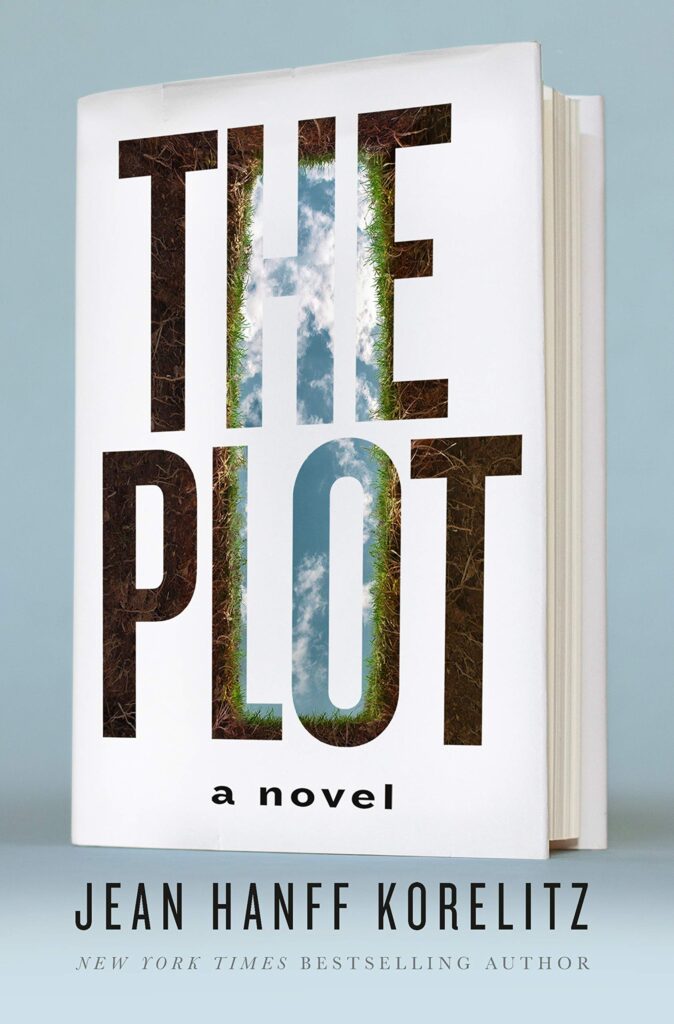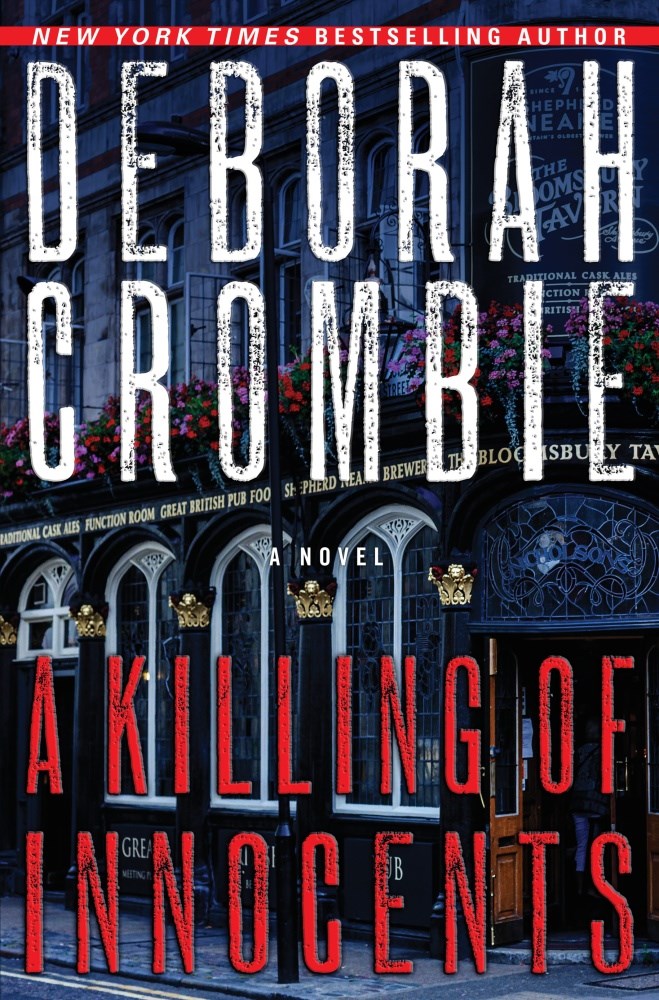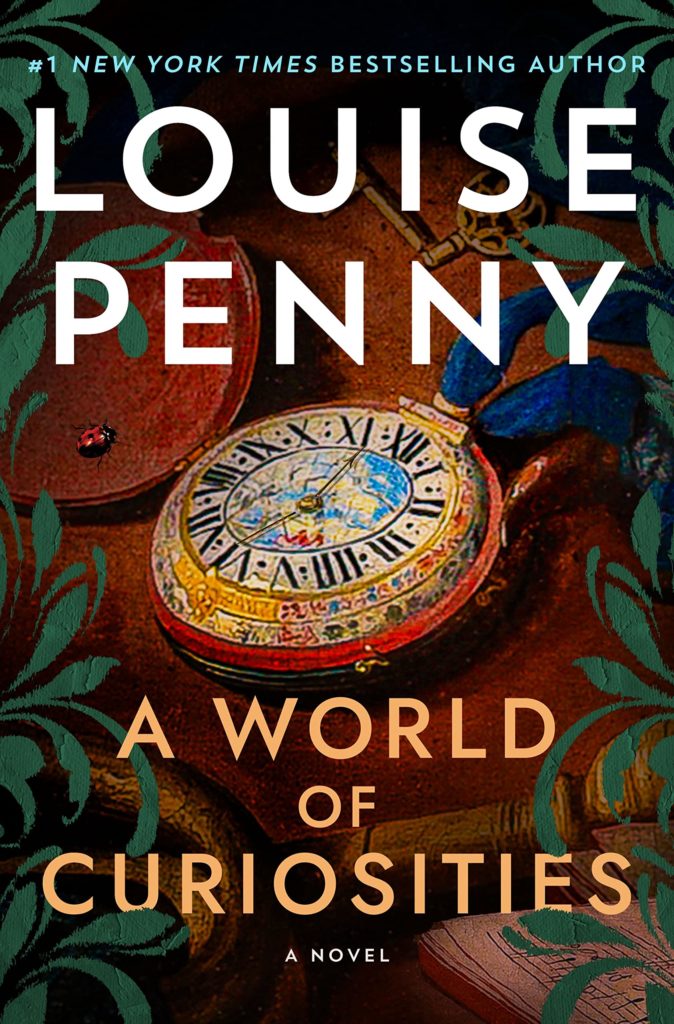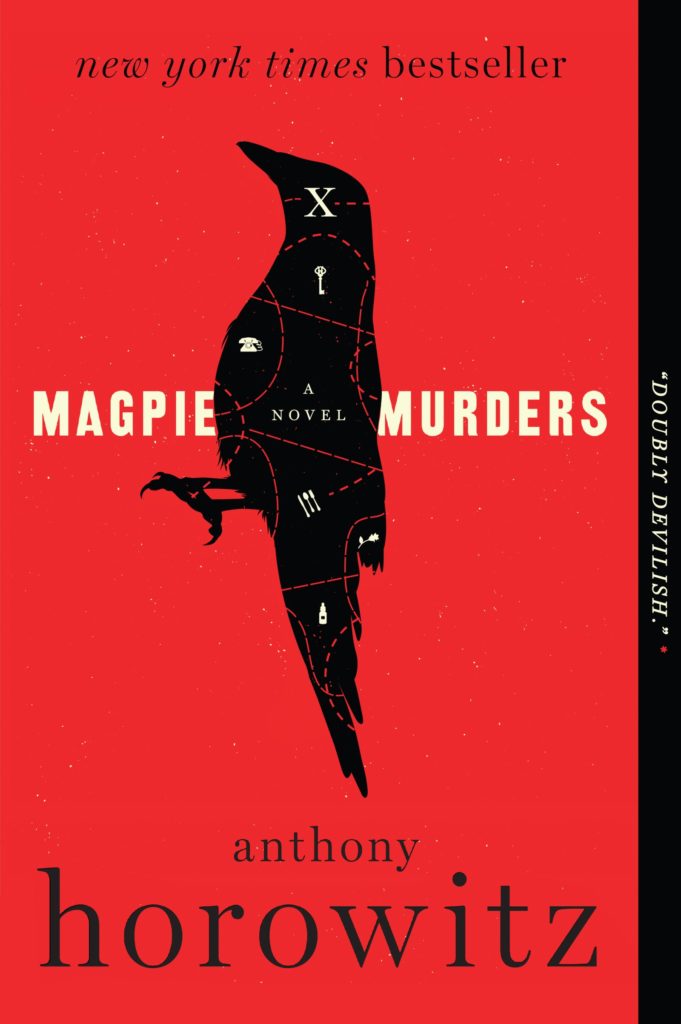I Got Nothing …
Sorry dear readers, I have nothing to share at present.
No book recommendations, no reviews, nothing.
I can’t seem to land on a book, nothing is grabbing my interest beyond the first few pages…
I know it’s my mood and definitely not my books. I have hundreds many great possible reads awaiting me. Most of which I know I’m going to devour, but nothing is clicking…
Here’s what I’ve tried and discarded so far…
I was very keen to read The Covenant of Water as the author’s previous book was one of my all time favorites. But, one-third of the way through, I suddenly got bogged down…again not the book’s fault. Ann Patchett is always a favorite, but even her beautiful writing couldn’t seduce me further than a few pages.
So I turned to my trusty mystery collection, thinking a good mystery will be perfect – but no, nothing grabbed my attention. Moonflower Murders is a sequel to The Magpie Murders ,which I really enjoyed. Rumors are that there will be a PBS mystery sequel as well (yes, please PBS). And just look at the cover from the very classic British Library Crime series. But again, no – nothing clicked.
And then there’s these enticing advanced reading copies for books coming out next year. Yup, tried these too…
Please know, it’s not these books’ fault – it’s my scatterbrained mood.
Restless and despondent (hey, it’s my blog I can be as dramatic as I want) I rearranged some books, did some more dipping in and out of other books and came across this last evening. An old work friend (who sadly passed away during COVID) gave me this book. I found her note in the book, saying she thought I would enjoy these stories. Well, that’s depressing I thought, but, oh well – I’ll give it a try…
From the back blurb:
For many years Pulitzer Prize-winning author Robert Olen Butler has collected picture postcards from the early twentieth century, not so much for the pictures on the fronts, but for the messages written on the backs, little bits of the captured souls of people long since passed away. Using these brief messages of real people from another age, Butler creates fully imagined stories that speak to the universal human condition.
I am not a big short story reader, I often find they leave me wanting more. But, given my mood, I thought maybe, just maybe this will be the one – finally the book to grab me, and it did.
I read two last night and one this morning with my tea. It’s too early to give you my full take on this book and admittedly, Mr. Butler uses a gimmick here – but so far, it’s a wonderful one. Using actual picture postcards he’s collected over the years, he creates a story from the messate on the postcard. He crafts characters, situations, and emotions — all from a few lines of personal communication between two unknown people.
Here’s a photo of the first story postcard, the message says:
This is where the people who have more money than brains put up. The pay about $100 per month for two rooms furnished when they could afford to have a nice home of their own. I had a job in this hotel last year. Worked there for a week. Saw lots of style, but don’t see as the people were any happier.
Mr. Butler gives us a story of a new bus boy working at a fancy hotel who meets a rich guest about his own age and they form a prickly relationship that ends in a most surprising way.
Stay tuned folks, I will try and read some more of these little stories and give you a full report.
Promise, I will have something for you next time.
The House Guest by Hank Phillippi Ryan
I came to this novel through one of my favorite mystery authors, Deborah Crombie – who writes a blog along with six other female mystery writers. When re-visiting Jungle Red Writers, I realized the publisher had sent me an advance copy of The House Guest by Hank Phillippi Ryan one of the other members of Jungle Red writing team (and yes her name is Hank – isn’t that great?). I quickly put it at the top of my Kindle list for a long plane ride.
Full disclosure, I don’t read many thrillers, and when I do, I save them for – well, long plane trips. As I need page-turners that keep me entertained for the entire flight. (I remember barely looking up from ‘Gone Girl’ during a long trip back from Europe.)
Back to this novel – The House Guest — and even though no one’s asked, I really don’t like the cover —
After over eight years of marriage, Alyssa Macallan’s husband Bill has walked out of her life and their up-scale Massachusetts home. Bill is a powerful fund raiser and together they lived a rich lifestyle Now, her supposed friends at the country club are snubbing her, her housekeeper is her only contact, and the future seems bleak.
Avoiding going home to an empty house, Alyssa stops by a bar one night. There she meets a woman she would never have befriended in the past. But Alyssa needs an ally and a friend and they instantly hit is off. Bree is running away from her own dangerous relationship, hiding out in the somewhat downtrodden hotel attached to the bar. Offering up the safety of her guest house, Alyssa is soon escorting Bree back to her home, confident that she’s helping out someone who needs a place to hideout.
Over the following days, the two become close and swap stories of the relationships they’ve recently walked away from. Suddenly, Bree has a brilliant scheme. What if they could solve each other’s problems? But does Alyssa know her new friend as well as she thinks she does? Or is Bree merely pretending to be her close confidante?
By now, I’m shaking my head at the recklessness of inviting someone you met in a bar to live in your guest house, and then the very outlandish idea of helping each other with their ex-partner problems. (Strangers on a Train anyone?). Also, Bree has become close to the male FBI agent investigating Bill – or is he? More than just a little suspicious and obvious.
Wow, I’ve got this figured out already, I said to myself…I’ll give it a few more chapters just to see if I’m right.
Well, folks I’m here to tell you I was wrong, The House Guest took several unexpected twists and turns and by now I was in it for the long haul. Who can be trusted? What is really behind the FBI investigation?
Ms. Ryan gives the reader a thriller, with interesting characters and page-turning plot. The House Guest questions the bonds of loyalty and friendship — who can be trusted and ultimately betrayal, This is a fast-paced, intriguing read ~~ I kept turning the pages for the entire flight and it had me guessing right up to the end.
So if you have a long plane trip, I suggest you pack The House Guest for your in-flight entertainment.
A digital review copy was kindly provided by Forge Books via Netgalley.
The Plot by Jean Hanff Korelitz
After my recent bout with unsatisfying and abandoned books, I turned to a summer reading favorite – mystery novels. I picked this one because the plot of The Plot involves a best-selling writer, a stolen plot, literary treachery, and an examination of what defines plagiarism.
Jake is a novelist who experienced early modest acclaim, but he hasn’t been able to replicate that success in his subsequent books. He is now a writing instructor at small, second-rate writing program in Vermont.
Jake meets with his new student, Evan Parker, who has an incredible confidence in himself and his work, although he won’t share much other than a cursory few pages of work. After reading these few pages, Jake assumes Evan is without writing skill and in a one-on-one meeting shares his concerns about a lack of produced pages. Evan reluctantly shares his novel’s plot line with Jake, who realizes it is indeed a blockbuster plot – in fact — The Plot.
Over the years, Jake morosely works on his writing only to have rejections. Meanwhile he awaits the publication of Evan’s novel which he expects to be a best seller. Then Jake learns that Evan died before completing the book — so Jake sits down and writes his own version based on the infamous plot.
The resulting novel has phenomenal success, New York Times best seller list, Oprah, book tours, media interviews and even movie rights. Jake should be riding high on this success. Yet he lives with the constant dread that someone, somewhere knows this plot, his book, wasn’t his original idea.
But his worst fears come true, someone does know and starts sending him messages about the fraud and threatening to expose him. Jake sets out to try and find out who could possibly know, as most of the deceased Evan’s family is dead.
Now, usually when I read mysteries I try and figure out who dun it – half the fun in reading mysteries. Usually I’m wrong – or way off — case in point The Murder of Roger Ackroyd.
About three quarters of the way through The Plot I did figure out who was the culprit behind the messages and threats – I was certain this time and I was correct. However, no gold stars for me — I’m pretty certain Ms. Korelitz did this will full intention — she wanted the reader to know, and Jake to be in the dark.
Even so, I kept reading, kept turning the pages — greatly appreciating the author’s plot twists and the devious suspense building.
What I also found interesting, was the insights into what is, and, is not plagiarism. Jake based his novel on an idea someone else had. The Plot discusses other such novels based on someone else’s works, such as Jane Smiley’s, A Thousand Acres, based on King Lear.
The ending, well it wasn’t what I wanted – but then again, I’m not an author. And after reading The Plot, I’m very glad I’m not…who knows where any writing ideas might come from?
Without giving any more away, I will close with this enticement. You see, Jake thought the threats were all about plagiarism, but he was totally wrong. The anonymous email writer had much more to settle with him.
And that, my Book Barmy friends, is the real plot.
I recommend The Plot as a page-turning, suspenseful mystery/thriller, perhaps your summer vacation read.
A digital review copy was provided by Celadon Books via Netgalley.
A Killing of Innocents by Deborah Crombie
Ms. Crombie writes one of my best loved mystery series. I’ve raved about her books here on Book Barmy for many years. Her devoted readers had to wait a a very long four years for this newest installment, A Killing of Innocents. My library hold finally came through a couple of weeks ago and I happily dove right in.
Duncan Kincaid and Gemma James are back, and once again, we get to read about their professional and personal lives. Their relationship and their children (one his, one hers, and one adopted) continue to change and develop throughout the series. These characters are so so well drawn, they’ve become almost real to me after 19 installments.
But wait, there is a mystery. Duncan is in a local pub waiting for his fellow officer, Dog Cullen, when he sees a young woman in hospital scrubs leaving the pub — both upset and worried . Later, when he and Doug go to leave, cutting through a park, a distraught woman and child call out to them. When they go to take look, they realize it’s the same woman, lying dead in the grass, The victim, Sasha Johnson, was a junior doctor at a nearby hospital and was stabbed. Duncan regrets that he should have known the woman was in trouble and feels an extra responsibility to solve her murder.
Duncan and his team, with the help of Gemma, his wife, try to track down a killer. The motive is not immediately apparent, and before they can uncover any clues — another body is found stabbed in the same way, but at a different location. Are the two murders connected? What connects them? The stabbings set up the suspense, but the setting in a cold and damp London which grows dark early in late November, adds a creepy atmosphere to the story-line.
Meanwhile, back at Gemma’s and Duncan’s busy household, everyone is stretched thin with ballet rehearsals, children’s nightmares, and the older son both studying and working at the cafe. While other readers may complain that these domestic details detract from the mystery, I find it gives the story depth. The sometimes strained friendship (or is it more?) between their co-workers Melody and Doug hits some bumps –and these personal tensions add to the plot.
Sometimes The Killing of Innocents teetered from an abundance of characters, as if Ms. Crombie needed to include every protagonist, their acquaintances and friends from previous novels. But I carried on, realizing that not all the characters were directly involved in the mystery itself – but rather background characters.
And just to keep the reader guessing, there is an italicized narrative by an unknown speaker throughout the mystery — which is unsettling and somewhat confusing. However, in the end, Ms. Crombie pulls off a big reveal that pulls the ending together.
The mystery–the slaying of an ambitious young doctor and other victims — has some twists and turns, as the different threads of the story come together at the end. This was a twisty mystery and I was unable to guess the solution
A Killing of Innocents is a hard-hitting portrayal of the work of busy homicide detectives, with an intriguing, multi layered plot which, turns out, is not easy to figure out.
N.B. Darn it, I forgot to take a photo of the charming hand-drawn map which have become a typical bonus with Ms. Crombie’s hardback editions. I had to return the library book.
Here’s a sample of a map from a previous book, just so you can appreciate what I’m rattling on about.
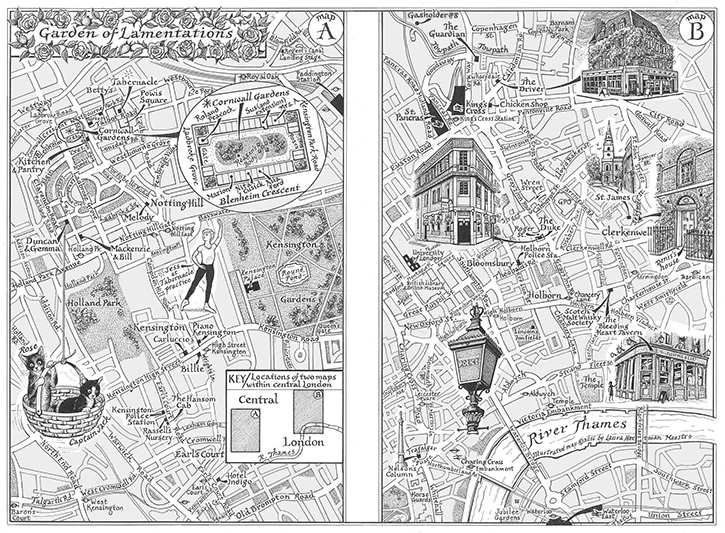
A World of Curiosities by Louise Penny
Every time I start a new Louise Penny book, I promise myself I will read it slowly and savor each and every sentence, but I usually devour them in one or two long reads.
However, with A World of Curiosities, it has taken me forever. My mistake. I bought it on publication day at the end of November, and then Thanksgiving arrived and I had to put it aside several times, then it was the holidays and I had many other things to do, including (as usual) knitting gifts while watching Christmas movies. In short, I was way too distracted.
I only recently picked it up again, having made it almost half-way through and decided I wanted to remind myself of the beginning. I started it again, and this time, read it in great big chunks of time, during our recent storms.
I am so glad I started it over as this is one of Ms. Penny’s best-plotted mysteries and filled with many intricacies and story lines.
The story opens with Jean-Guy Beauvoir and Armand Gamache’s first meeting at a crime scene and the beginning of their mutual bond. Ms. Penny doesn’t just use this as a prequel. Instead, this origin story becomes the jumping-off point for the current-day mystery — and what a mystery.
As I read along, I kept thinking of what Gamache says to Jean-Guy during their first encounter – There is always another story. There is more than meets the eye.
The story moves to a combined commemoration and graduation ceremony at the École Polytechnique Montreal. The engineering university was the actual scene one of the worst tragedies in Canadian history: the Montreal Massacre in 1989. A horrific mass killing of female engineering students by a man who separated the male students from the women, and told the men to leave. Outraged by women moving into what was a formerly male-only domain of engineering — he shot all the female students he could find.
In addition to reminding readers of this terrible crime, the scene also serves to introduce two important new characters of this entry in the series, Harriet Landers and Fiona Arsenault, who both graduate as engineers during the ceremony. We are also introduced to Sam Arsenault, who alarms and frightens Gamache.
Upon viewing Three Pines from a rooftop, the recent engineering graduate, Harriet points out an odd part of one of the village’s buildings, and decides there must be a hidden room in Myrna’s loft above her bookstore. And when opened up, the room uncovers many secrets from the past and a huge montage canvas which mimics the famous The Paston Treasure — an oil painting that serves as a historically rare record of a cabinet of treasures in British collecting.
The painting has a multitude of worrying hidden messages and puzzles that alarm and alert Gamache to an old foe intent on destroying everything and everyone Gamache holds dear.
And that’s about all I can tell you about A World of Curiosities without revealing too much. Suffice it to say, there are two different and often dark story lines – resulting in the search for a lunatic. The last few chapters are filled with such tension and bombshells, at times, I forgot to breathe.
Don’t worry Book Barmy friends, we still have Three Pines; the wonderful food, the serene bench overlooking the village, the grouchy poet, Ruth and her foul-mouthed duck, Rosa, the therapist Myrna, the artist Clara and, of course, Olivier and Gabri — all with their support of each other and a strong sense of community.
What the village in the valley offered was a place to heal. It offered company and companionship, in life and at the end of life. It offered a surefire cure for loneliness.
Ms. Penny always envelopes her readers in a world of knowledge — a world of curiosities, if you will –as she brings art and music, poetry and history into the story. For example, we learn that the École Polytechnique gives its graduates rings made made from the metal remains of the first Québec Bridge which collapsed in 1907, killing eighty-six workers. It was a catastrophic failure of engineering. The rings were made to remind engineers of that disaster, and the consequences of what they do.
Over the course of the Three Pines series, we’ve watched as Gamache uncovered the worst in society. But this time, he has to uncover and examine the worst in himself, as well confront as his deepest fears.
Like all Ms. Penny’s series, A World of Curiosities is never “just” a mystery novel — but rather an artful balance of suspense, combined with thoughtful human insights — along with social and moral issues.
The main reason I read this series is each one always brings up questions of morality, forgiveness, fear, courage and acts of human decency, which in the end, are the true messages of hope in life, and which we all too often miss.
Ms. Penny, you continue to amaze. Still your biggest fan.
Magpie Murders by Anthony Horowitz
First, there’s the book ~~
Then, there is the PBS Masterpiece Series ~~
I make it a firm rule, to read the book before I watch any film or television adaptation. And in the past, I almost always, always prefer the book ~~ but not in this case…
Don’t get me wrong the book was very, very good, but Magpie Murders was made into an almost more appealing story by Masterpiece/PBS by the author himself. You see, Anthony Horowitz, is the also creator of “Midsomer Murders” and “Foyle’s War” — both super PBS series, and he obviously excels at bringing a static book to life on the screen.
First the book:
Magpie Murders has a dual plot– two mysteries in one. We open in current day with an editor, Susan Ryeland settling in over a weekend to read the newest manuscript from her publishing firm’s best-selling mystery author. After the first chapter, the story then switches to the manuscript she is reading — an old-fashioned whodunnit, set in the 1950’s written by the fictitious author, Alan Conway, who created a famous detective in Atticus Pünd.
The first 200 or so pages of Magpie Murders are very reminiscent of an Agatha Christie novel, and I was wondering while reading it why there was so much hype about the book. The manuscript was a typical cozy mystery set in an English village with a host of Christie-like characters. But, those first 200 pages seemed to drag a bit as each suspect was introduced with their pertinent backstories. But, in the end, they serve to set up the real story which unfolds in the second half of the novel. You see, the manuscript ends abruptly because its last chapter is missing and we (and the publisher) have no idea ‘who done it’. That’s when Magpie Murders became a page turner for me, as the publisher tries to find the missing chapter, and solve not only the murder in the manuscript, but also a possible contemporaneous murder. Mr. Horowitz uses the second half to bring together many loose ends between the manuscript mystery and our modern day one — but I won’t tell you any more.
I know, I know it sounds very confusing, but stay with me here…
The book contains some great literary tricks — Mr. Horowitz combines humor, drama, and intrigue — which makes for a multi-layered story that eventually becomes riveting. There are hidden meanings and anagrams, which are revealed in the second half of the book — quite fun to read. (Atticus Pünd’s anagram was my favorite, but not suitable to repeat here.) There are really three authors – the manuscript author and the modern day best selling mystery author – both of whom are actually Anthony Horowitz. Okay I’ll give you a moment here to digest all that.
Within the pages, the author (and Mr. Horowitz) marvel at our appetite for crime. Saying at one point, the BBC would have little to broadcast — if not for crime programming:
Inspector Morse, Taggart, Lewis, Foyle’s War, Endeavour, A Touch of Frost, Luther, The Inspector Lynley Mysteries, Cracker, Broadchurch and even bloody Maigret and Wallander – British TV would disappear into a dot on the screen without murder.
It’s strange when you think about it. There are hundreds and hundreds of murders in books and television. It would be hard for narrative fiction to survive without them. And yet there are almost none in real life, unless you happen to live in the wrong area. Why is it that we have such a need for murder mystery? And what is it that attracts us? The crime, or the solution?
Do we have some primal need of bloodshed because our own lives are so safe, so comfortable?
Now to the PBS Masterpiece version, which I watched only after I finished the book. As I alluded earlier, the television series enhances the book and brings it to life in a most wonderful way. The connections between the manuscript and the current day mystery are clearer and the series brings these two timelines and worlds together in a most entertaining way.
And in a magical turn, our editor in current day and Atticus Pünd from the 1950’s, come together to solve the case of the missing manuscript chapter and the possible murder of the manuscript author. Atticus Pünd appears and advises Susan Ryeland as she visits the village where her famous mystery writer lived. Is it real or is it imagined? We are left to interpret for ourselves.
Whereas in the book, Atticus only appears in the pages of the manuscript. Also, the book is a bit more work, the reader has to link the bridges between to the two mysteries and work to sort out the connections. The book also has many more suspects than in the television series.
The television version of Magpie Murders crosses back and forth in time allowing for a reprieve from the more classically-paced 1950’s mystery manuscript. And wonderfully, the same actors play dual characters in the manuscript and current day. You see, the famous mystery author based his characters on modern-day neighbors, villagers, police, and lawyer – often times not so kindly.
I know you’re probably a bit baffled by all this so I’ll close by recommending Magpie Murders – however you can get it — by book or by television.
Either way, a terrifically unique mystery and really entertaining.
Here’s the trailer for the PBS series







